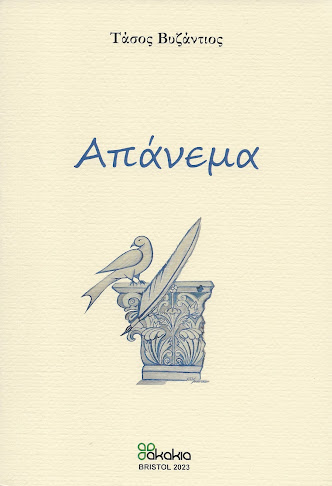"A Greek gentleman in a straw hat, standing
absolutely motionless at a slight angle to the universe.”
EM Forster
On 21 February, AE Stallings, the Oxford University
Professor of Poetry, delivered a lecture with the title ‘What These Ithakas
Mean: Cavafy, Translation, Influence and Imitation’. She explored each of these
aspects with great insight and understanding. In time, the lecture will become
available on the Oxford English Faculty website. Alicia Stallings is a fine
American poet who has lived in Athens for the last 25 years with her Greek
husband and family.
She started reading, in both Greek and English,
Cavafy’s poem Ιθάκη - Ithaka.
Ithaka
As you set out for Ithaka
hope your road is a long one,
full of adventure, full of
discovery.
Laistrygonians, Cyclops,
angry Poseidon—don’t be afraid
of them:
you’ll never find things like
that on your way
as long as you keep your
thoughts raised high,
as long as a rare excitement
stirs your spirit and your
body.
Laistrygonians, Cyclops,
wild Poseidon—you won’t
encounter them
unless you bring them along
inside your soul,
unless your soul sets them up
in front of you.
Hope your road is a long one.
May there be many summer
mornings when,
with what pleasure, what joy,
you enter harbors you’re
seeing for the first time;
may you stop at Phoenician
trading stations
to buy fine things,
mother of pearl and coral,
amber and ebony,
sensual perfume of every kind—
as many sensual perfumes as
you can;
and may you visit many
Egyptian cities
to learn and go on learning
from their scholars.
Keep Ithaka always in your
mind.
Arriving there is what you’re
destined for.
But don’t hurry the journey at
all.
Better if it lasts for years,
so you’re old by the time you
reach the island,
wealthy with all you’ve gained
on the way,
not expecting Ithaka to make
you rich.
Ithaka gave you the marvelous
journey.
Without her you wouldn't have
set out.
She has nothing left to give
you now.
And if you find her poor,
Ithaka won’t have fooled you.
Wise as you will have become,
so full of experience,
you’ll have understood by then
what these Ithakas mean.
This is the translation by
Edmund Keeley and Philip Sherrard; the writer has read several translations and
does not think this one has ever been bettered.
It is well known that Cavafy
did not publish, commercially, any poetry in his lifetime; he printed small
pamphlets of his poems which he circulated among his circle. He was nonetheless
acclaimed as an outstanding poetic talent. The first translation was that of
John Mavrogordato in 1951; another notable early translation was by Rae Dalven
in 1961. What brought the works of Cavafy to a much wider audience was when the
poem Ithaka was read at the funeral of Jacquleine Kennedy Onassis in 1994.
Alicia Stallings touched on
other interesting aspects of Cavafy’s life: that he was born on 29 April 1863
(old calendar) and died on 29 April 1933 (new calendar). His 70th
birthday. His name: Constantine - resonant of Byzantium; Cavafy – perhaps from
the Turkish word for ‘a shoe-maker’. 154: both, the number of poems in the body
of Cavafy’s work; and, the number of sonnets written by Shakespeare. The poet’s
gross [144]? she speculated.
In Stallings’ view, the only
poet to match Cavafy’s influence across the whole poetry world is Emily
Dickinson. In looking to explain the particular quality of Cavafy’s poetic
voice, she thought an important element of it was a ‘flatness’. Seferis had
found something similar and felt it matched the flatness of the Alexandrian
landscape. Stallings noted the factual basis of many of his poems and the
presence of a prose quality as a building block of the poetry. This was
refreshing: usually there is no greater insult a poet can deliver to the poetry
of another than to say ‘it is prose’, not poetry at all.
It is beyond the scope of this
report to consider in detail the specific poems of Cavafy referred to in the
lecture. These included:
·
Walls (that illustrates the scope for rhyming in Greek
poetry)
·
In a Large Greek Colony
·
In the Year 200 BC
·
Days of 1908 (written in 1932, shortly before Cavafy’s
death)
Stallings described the ‘Days
of …’ poems, of which Cavafy wrote several, as ‘a new genre of the lyric poem
in the aorist’. She noted that there persisted in Greece some reluctance to
acknowledge Cavafy on account of the homoerotic content of several of his
poems. Many gay poets have found him a particularly relevant inspiration.
The lecture considered poems
by other poets that were also inspired by, or at least owe some debt to,
Cavafy. Notably Auden’s poem Atlantis written in 1940, shortly after he
re-located to live in America and the poem To go to Lvov written by Adam
Zagajewski.
AE Stallings (the name in
which she is published and the one she uses in her social media accounts –
Bluesky and X) has posted several times in the last five weeks referring to
Cavafy’s poetic enquiry ‘why are the Senate not legislating?’
Which observation helped bring
her to the conclusion ‘Ithakas are everywhere’.
Richard Devereux












































No comments:
Post a Comment